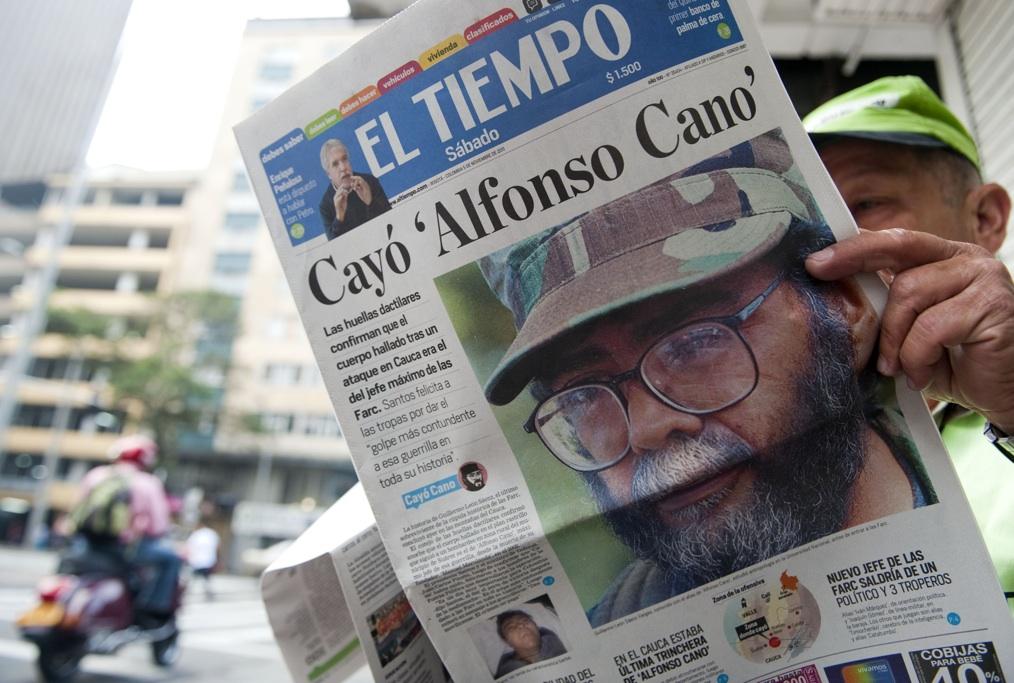FARC leader’s death could delay peace
A man reads a newspaper reporting on the death of the leader of the Revolutionary Armed Forces of Colombia (FARC), Alfonso Cano, at a newsstand in Medellin, Antioquia department, on November 5, 2011.
BOGOTA, Colombia — The death of the top commander of Colombia’s main rebel group, the Revolutionary Armed Forces of Colombia, or FARC, on Friday night marks a major blow to the rebel group, officials said.
“The death of Alfonso Cano is its biggest blow in history,” Defense Minister Juan Carlos Pinzón told reporters at a midnight press conference.
It could also delay the end to a conflict that has persisted in Colombia for nearly 50 years.
Cano was considered key in uniting the FARC’s top ranks, which has been torn between a military and political approach to their resistance, said Cesar Castaño, an expert in military strategy and former military officer.
Since President Juan Manuel Santos became president last August, Cano had suggested in communiqués that he might be willing to negotiate with the government, raising hopes of peace negotiations between the two sides.
The loss of the FARC’s top leader likely won’t destroy its ability to operate — the organization is run by a seven-member secretariat that
already has replacements lined up in the case of a death.
But his absence could make it more difficult for the rebels to organize effectively around a plan of action, peace or otherwise.
Read more: Colombia falls prey to the drug wars
“He’s the only one who can keep the FARC united,” said Felipe Salazar, an ex-guerrilla who worked closely with Cano as a regional leader, in
an interview last year.
Not everyone believes the hope of peace negotiations died along with Cano, however. A 2006 U.S. Embassy cable indicates that one of his possible replacements, Ivan Marquez, may be willing to negotiate.
President Santos has said his government is open to considering negotiations, but that the FARC must show its serious intent by ceasing all terrorist activities, such as kidnapping. The FARC has indicated in the past several months that it will be willing to release all remaining political hostages, estimated to number around 20 military and police officers.
Read more: Will FARC's female rebels lay down arms?
Cano, whose real name was Guillermo Saenz Vargas, took over leadership of the FARC in 2008 following the death of former leader Manuel
Marulanda.
At the time, the insurgency had seen its ranks cut almost in half from an estimated 18,000 fighters in 2001, due to heavy military offensives
and mass desertions.
Its Marxist ideology had been obscured by an embrace of terrorist attacks and drug-trafficking. Cano worked to revive the ideological roots of the FARC, which oppose inequality and aim to represent the rural poor, focusing on building support in cities, creating urban cells and infiltrating universities.
He also bolstered its military capacity, returning to classic guerilla warfare in the face of consistent attacks from the Colombian
military. They operated in small, hard-to-detect cells, sometimes dressed as civilians. They increased their use of improvised-explosive devices.
Cano understood that adaptability was key to the FARC’s survival, Salazar said. “`The strength of bamboo is in its flexibility,’” Salazar remembers Cano saying, who he also mentioned had a particular affinity for almonds and wine.
Cano became the military’s number-one target after the FARC’s military strategist, ‘Mono Jojoy,’ was killed in a September 2010 military
attack.
Since then, over 5,000 troops were assigned the exclusive mission of hunting down Cano and his rings of security in the Cañon de las Hermosas where he was believed to be hiding.
But the bearded, spectacled Cano, 63, always managed to elude the encroaching army, which had to confront the hostile mountain region in
Colombia’s southwest that has been a FARC stronghold since the group formed in 1964.
In the past year, the rebels stepped up attacks on soldiers and civilians. In the run-up to local elections on Oct. 30, the FARC killed 20 soldiers within a 2-day period.
Following a bombing by Colombia’s Air Forces in the area south of where he was believed to be hiding early Friday morning, army special forces moved in to the area.
Cano was with 14 other rebels when he was killed in the ensuing combat, the defense minister said. Cano’s security chief was captured, and four members of his inner security ring, including his radio operator, were also killed in the military attack. A woman, who may have been a girlfriend or nurse, was also killed.
The story you just read is accessible and free to all because thousands of listeners and readers contribute to our nonprofit newsroom. We go deep to bring you the human-centered international reporting that you know you can trust. To do this work and to do it well, we rely on the support of our listeners. If you appreciated our coverage this year, if there was a story that made you pause or a song that moved you, would you consider making a gift to sustain our work through 2024 and beyond?
